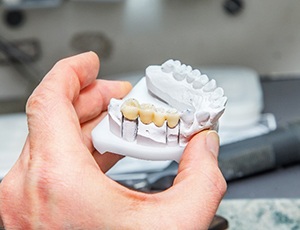Dental Bridges – Harrisburg, PA
Have a Complete, Healthy, and Gorgeous Smile Again

Dental bridges are one of the most common tooth-replacement solutions – for good reason too! They are reliable, they deliver beautiful results, and they can restore the look and function of your smile for years (if not decades) to come. If you’re interested in learning more about this smile-enhancing treatment and you’re located in or around Harrisburg, then contact our team at Klein Family Dentistry to schedule an appointment. We’re here to help whenever patients need us most!
Why Choose Klein Family Dentistry for Dental Crowns?
- Named “Top Dentist in Central Pennsylvania” in Harrisburg Magazine
- Highly Rated Dental Team in Harrisburg
- Convenient Appointment Times Throughout the Week
What is a Dental Bridge?

A traditional dental bridge uses two dental crowns, one on each side, which support a replacement tooth or teeth. The replacement is fused to the dental crowns, which are then cemented to healthy teeth on either side. Like dental crowns, the bridge is placed over the course of two appointments. During the initial visit, we prepare the teeth, capture impressions, and place a temporary. Then, you’ll return to the office to exchange your temporary bridge for a custom fixed bridge.
Types of Dental Bridges

At Klein Family Dentistry, we offer our patients two different types of dental bridges: traditional and implant-retained. The one we recommend for you will depend on a multitude of factors, including the extent of your tooth loss, the density of your jawbone, and your budget. Of course, we will review all of this and more at your consultation, but, if you’re curious, you can also read on to learn a bit more about each type of dental bridge.
Traditional Dental Bridge
As mentioned above, traditional dental bridges anchor your replacement tooth (or teeth) in place with a dental crown on each side of the gap. Typically, this smile-enhancing treatment is recommended for patients who are missing one tooth or 2-4 consecutive missing teeth. Although it’s possible that some of your natural, healthy teeth will need to be altered, you can have peace of mind knowing the end result will be a smile that’s as healthy and functional as it is beautiful.
Implant Bridge
Like traditional bridges, implant bridges are custom-made for each patient and designed to replace one tooth or several teeth in a row. There are some stark differences between the two, however, including that this type of dental bridge uses dental implants to secure the replacement teeth in place. This comes with numerous benefits, including added stability and a 20+ year lifespan (with proper care).
The Benefits of Getting a Dental Bridge

Addressing tooth loss with a dental bridge comes with numerous benefits, such as:
- The alignment of your teeth will be preserved.
- You can eat a varied, well-balanced diet again.
- The materials used are extremely natural-looking, meaning the end result will be lifelike.
- They can last for upwards of 30 years if you choose an implant bridge.
- You can care for a dental bridge the same way you care for your natural teeth (i.e., brushing and flossing consistently, avoiding unhealthy dental habits, getting a dental checkup and cleaning every six months).
Dental Bridges FAQs
How Long Should a Dental Bridge Last?
Generally speaking, this method of tooth replacement lasts anywhere from 5 to 15 years. However, the amount of time that you can expect your dental bridge to last can vary drastically depending on several factors.
For one, metal dental bridges will stick around a bit longer than tooth-colored ones, but the difference is often close to negligible. More important is your individual dental hygiene; if you brush twice a day, floss daily, and see us biannually for checkups, you can dramatically increase the lifespan of your tooth replacement.
The location of your dental bridge also tends to affect its durability, as those that replace molars tend to be placed under much greater pressure.
How Many Teeth Can a Dental Bridge Replace?
In most cases, dental bridges are designed to replace anywhere from one to four teeth. However, it’s best suited to replacing only one or two; the more false teeth that a dental bridge includes, the higher the likelihood it will fail.
The issues are compounded if your natural teeth aren’t all that healthy. In this situation, it becomes especially risky to try and replace three or four teeth for a single bridge. Thankfully, implant bridges can make these kinds of dental bridges safer and more stable—if you need to replace many teeth in a row, these might potentially be a better option for you.
How Do I Clean Under My Dental Bridge?
When it comes to daily dental hygiene, you can brush your dental bridges just like you could your regular teeth. However, it’s also common for food and plaque to accumulate underneath your dental bridge, and an important part of keeping them healthy is to clean underneath them frequently.
There are a few ways to go about this: For one, you can try pushing ordinary dental floss under the dental bridge, but many people find this difficult. You might want to use a floss threader, which is like a dull plastic sewing needle that dental floss can be fed into. This can allow you to slip dental floss underneath the tooth replacement.
There are also interdental brushes, a small stick with bristles on it that can easily slide underneath the dental bridges. Oral irrigators like WaterPik can achieve a similar effect by using pressurized water. If you’re struggling to clean up underneath your dental bridges, talk to us and we can recommend methods that can help.
Can Dental Bridges Get Cavities?
Dental bridges are constructed from materials that are much more resistant to acid erosion and decay than natural enamel. This means that this method of tooth replacement won’t actually develop cavities in themselves. However, it’s still perfectly possible for the natural teeth underneath the dental bridge to get cavities; in fact, it’s just as likely as with any of your other teeth.
For this reason, it’s critical that you take good care of your dental bridge, cleaning both the surface of them and the area underneath.
